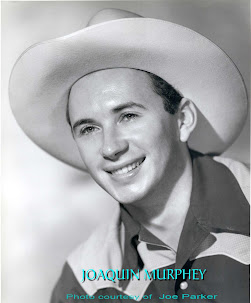Earl James "Joaquin" Murphey (often spelled "Murphy) (30 December 1923 – 25 October 1999) was an American steel guitarist who was the cutting edge lap steel guitarist of his time due to his clean legato playing and innovative chordal style. Music historian Andy Volk described Murphey as "a jazz musician disguised as a cowboy".
A native of Hollywood, he was born Earl James Murphey in 1923 and took up the steel guitar as a teenager. He took lessons from Roland Ball and Tommy Sargent, but by all accounts was something of a prodigy who didn’t need much help. He auditioned for a position with Spade Cooley during 1941 and amazed the listening musicians with his youthful virtuosity. Murphey joined the band and, courtesy of Cooley's manager Foreman Phillips, found himself tagged "Joaquin". Phillips believed that giving band members names that reminded fans of their own roots would prove a popular gimmick; Murphey's came courtesy of the San Joaquin Valley. In December 1944 he participated in Cooley's first recording session, contributing effective solo work behind the vocals of Tex Williams and Smokey Rogers on "Shame On You", a number that went on to become the biggest country hit of 1945.
Other notable sides from his time with Cooley included "You Can't Break My Heart" (1945), "Crazy 'Cause I Love You", "Detour", "Three Way Boogie" - which he co-wrote - and "Oklahoma Stomp" (all 1946). The band also appeared on film, starring alongside the Three Stooges in Rockin' in the Rockies (1945). In 1946 Tex Williams, the band's featured vocalist, left in a dispute over money and took several key bandmembers, Murphey among them, with him. He formed the Western Caravan and developed a tight ensemble sound modelled on that produced by his former boss.
On numbers like "Joaquin Special" and "Tennessee Wagoner" (both 1948) and "Fiddle Time", "The Campbells are Coming" and "Steel Guitar Rag" (all 1949) Murphey pushes his instrument to new harmonic and melodic limits. His contribution to the Caravan's adaptation of Stan Kenton's "Artistry in Rhythm", "Artistry in Western Swing" (1948), continues to startle in its originality. Murphey's impact on his instrument's development took a more practical turn when he commissioned a new steel guitar from an amateur inventor named Paul Bigsby, thus kick-starting the career of one of the great names in custom guitar design. Bigsby custom-built at least four steel guitars for him with his first in 1944 (including a double-neck lap steel, an early pedal steel, and a three-neck console model).
From May 1946 on, he appears to have free-lanced for a while before officially joining Tex Williams. He recorded with Tex Tyler later in May 1946 then performed briefly with Andy Parker and the Plainsmen who cut a clutch of stunning sides for Capitol. His featured solos included a cover of the Fats Waller classic "Honeysuckle Rose," and a "Sweet Georgia Brown" that is usually stashed away somewhere in every pedal steel player's treasure chest. Murphey also did some recording on pedal steel guitar, but his reputation was formed from the mid-'40s onward, before he ever approached the pedal instrument.
Joaquin was in constant demand with a number of the Western recording acts—familiar names such as Roy Rogers, T. Texas Tyler, Johnny Bond, and he would be involved in three sessions at RCA with the Sons of the Pioneers (1947-49). Instead of pursuing a more active recording career, he spent a large chunk of his career in Southern California working with dance bands.
He was fairly active recording through 1954. The date of his later stints with Cooley in the 1950s isn’t known although he made one LP with Cooley around 1959, after which he had effectively retired from music and dropped off the radar. An old acquaintance described Murphey as living almost like a hobo for several years. He spent a lot of time drinking which took a tremendous toll on his body and mind. But he managed to quit and started recording again in 1972 when the album Hawaii Forever was issued only in cassette form. In 1976 DeWitt "Scotty" Scott persuaded him to record a now-rare album for the Mid-land label.
In 1980 he was inducted into the International Steel Guitar Hall of Fame. His last album was a CD production eventually released under the title of Murph, a labor of love for producer Mike Johnstone of the Class Act label. This disc features tracks recorded between 1996 and 1999, using a custom-built, single-neck, nine-string guitar with six pedals.
Joaquin Murphey passed away on October 25, 1999 from complications caused by metastatic cancer.
Steel guitar giants such as Herb Remington, Buddy Emmons, Vance Terry, Leon McAuliffe, Noel Boggs and Speedy West have singled Murphey out as an important influence in their own jazz and swing enhancements.
(Edited from Independent obit by Paul Wadey, Wikipedia, Brads Page of Steel, Bransom Globe, AllMusic and Kenneth Rainy article)
Please note: - A big thank you goes to John Smith who suggested today’s birthday musician and for supplying most of the photos, and many mp3’s (also correcting my first draft.)







